Why Now Is a Good Time to Start a Company – State of Entrepreneurship Survey
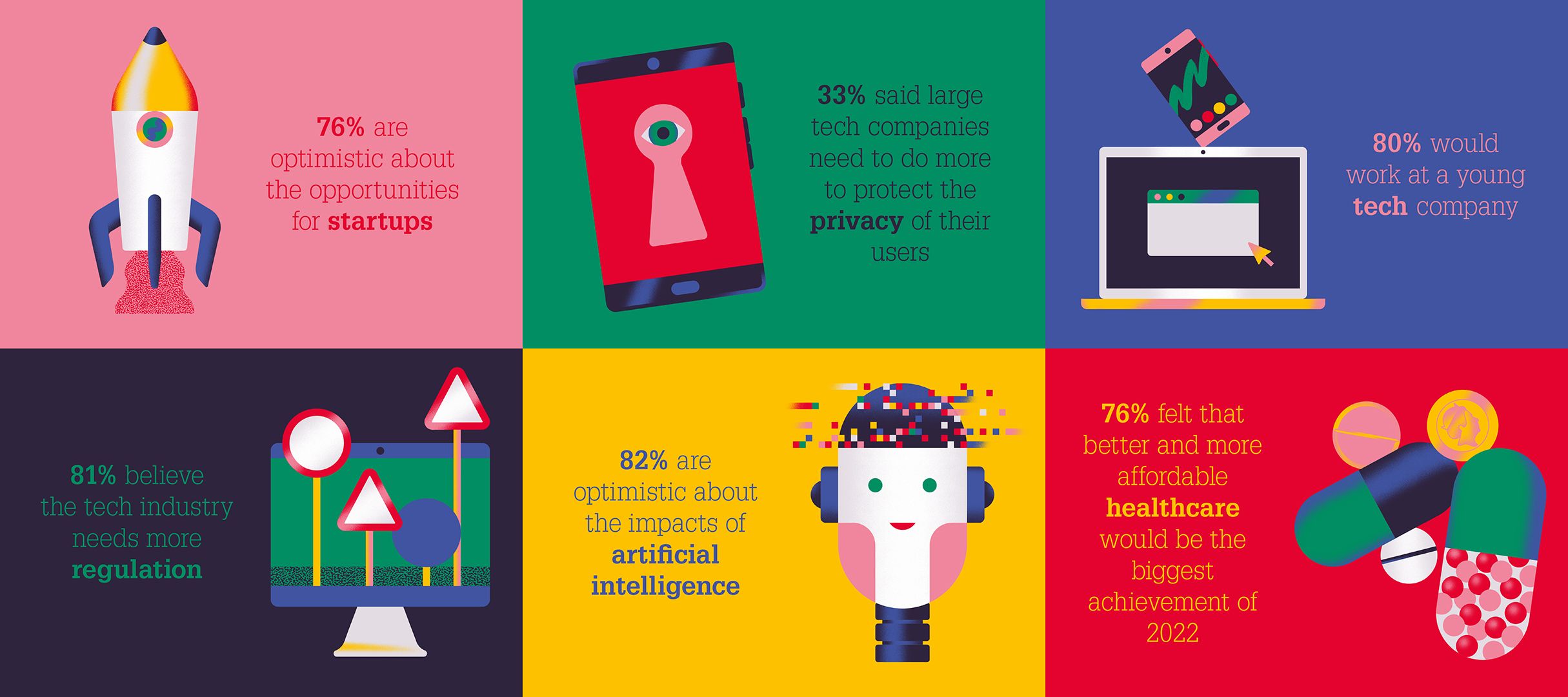
With the acceleration of our digital lives, entrepreneurs are actively pursuing creative ideas that challenge tech’s status quo.
The technology sector has remained optimistic despite the challenges of the Covid-19 pandemic, and is embracing the opportunities created by accelerated digitization, according to a survey published today by Index Ventures.
Conducted in partnership with Qualtrics, the survey asked 1,275 technology employees and university students about the impact of Covid-19 on startups, entrepreneurialism, and the potential of new technologies including artificial intelligence (AI).
Despite the uncertainties created by the pandemic, more than 75% of respondents said they were very or somewhat optimistic about the opportunities for startups right now. One third felt that lockdown has created new opportunities for online businesses, while a quarter said the pandemic had exposed weaknesses in larger companies. The big technology companies also came under scrutiny for their attitudes to data privacy, and an overwhelming majority agreed that the sector needs more regulation.
The results suggest a compelling landscape for potential entrepreneurs with strong ideas that build on the rapid demand for online services. The market is particularly active in the digital and AI segments, where tech workers found compelling new opportunities for innovation. The survey also found that many in the sector expect to see increased scrutiny and regulation for the big technology companies, which could make the market more favorable for new, smaller entrants in niche markets.
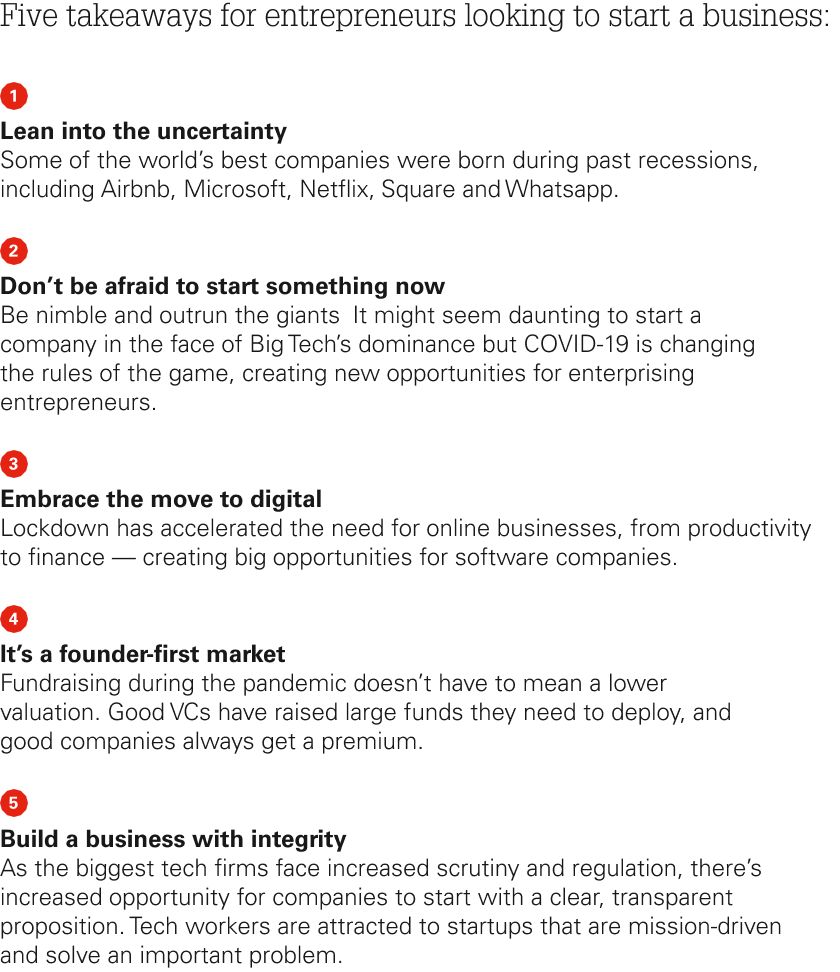
Optimism for starting up
Mike Volpi, a partner at Index Ventures, said the survey findings reflect a buoyancy and resilience he's seeing in the entrepreneurial community. Though many physical businesses like travel or retail continue to struggle, lockdown has forced companies to accelerate their digitization plans, which has been good for technology businesses offering services around data and digital productivity. ”Necessity is the mother of all innovation,” said Volpi.
"We have to be better at digitizing our businesses — using remote technology or dialoguing with customers through digital means — to be more competitive. And that creates terrific opportunities for technology providers."
— Mike Volpi, Index Ventures
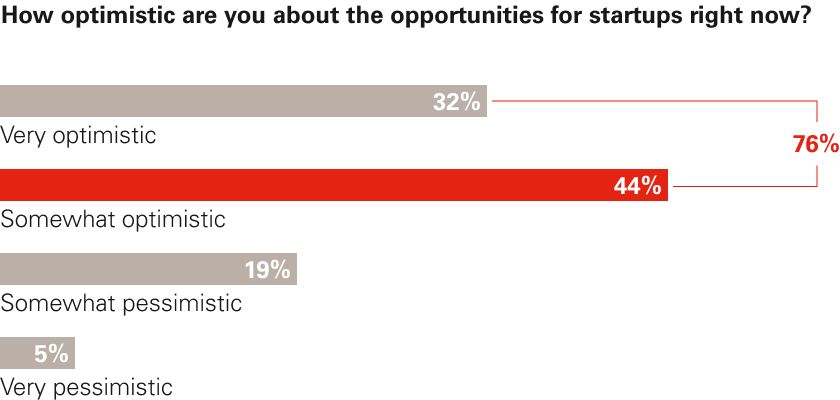
Another reason for the optimism, as Index partner Nina Achadjian explains, is that many venture firms had raised record sized funds before Covid hit. “Since most fund deployment life cycles are three to five years, there is still a large amount of capital available for startup funding,” she said. “In addition, this period of having to live in the internet has created a lot of opportunities for startups as it fast forwarded everybody into a fully digital future. Industries like healthcare, restaurants, and education, which traditionally use pen and paper or on-premise solutions, now will be searching for a solution to work in a purely online world. With this pull from the market paired with the abundance of capital still available, the world is ripe for some innovative startups to be created.”
Almost a third of those surveyed believed that there are interesting opportunities for new startups, while a further 30% said they felt lockdown had actually created more opportunities. A consumer-based service or app was the preferred type of business, with 15% opting for ecommerce and a further 15% who said they would want to start a B2B software business.
"Since most fund deployment life cycles are three to five years, there is still a large amount of capital available for startup funding."
— Nina Achadjian, Index Ventures
Of those surveyed, an overwhelming 80% said they would definitely or probably work at a young tech company. Some 32% of those said they could have more impact and learn more, 24% felt they would be more likely to be successful financially, and 23% said founders and leaders at startups were more likely to be honest and driven. The perceived opportunity to work with the smartest people was an added draw for 21%.
Despite the growing optimism, the survey detected apprehension about launching a new startup while the pandemic is still underway. Some 56% said they wouldn’t start a company right now compared to 44% that would. Volpi said it was understandable that potential entrepreneurs, many of whom leave the big technology companies to start their own businesses, had not wanted to leave the security of a guaranteed job during the pandemic.
“At the beginning of the lockdown there was a slowdown because of a sense of uncertainty and the fear that the bottom would fall out of the economy,” he said. “But true entrepreneurs are starting to get their bearings and getting used to this new world. Situations like this create change — and change is the perfect time to innovate with technology.”
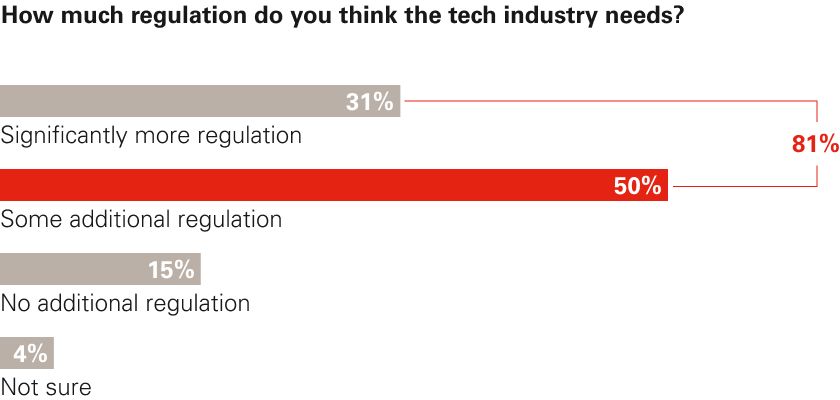
Google reigns among big tech
When diving into the topic of Big Tech, there was some good news for the big technology companies. Respondents repeatedly ranked Google on top as the most exciting company, followed by Apple and Amazon, and then by Netflix and Tesla. Almost a quarter of the respondents said Google was also the most essential company to set up new startups, followed by Amazon, Zoom, and Microsoft. Google again came out top as the company that has stayed most true to its mission, followed by Netflix, and Apple.
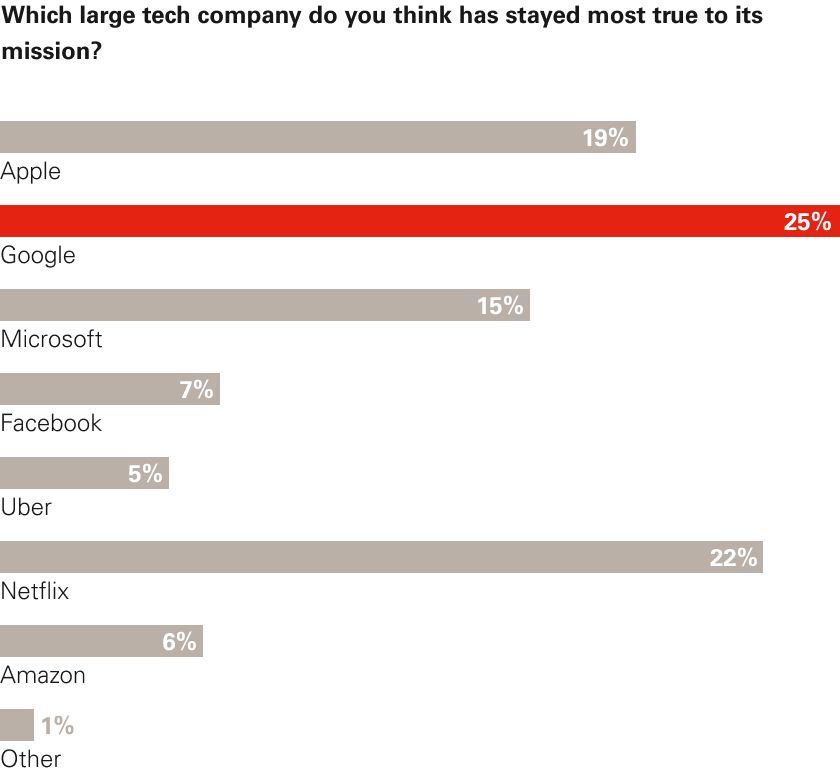
Yet there was outspoken and widespread concern over the power and practices of the big technology firms. An overwhelming 81% of respondents saying the sector needs more regulation. Use of private information was the top concern for 30% of people, as well as security of data (26%). A further 26% want more oversight and responsibility for content moderation, and 24% want misinformation and propaganda banned. Users commented that they have become “too big and too powerful,” and that “legislation hasn’t caught up because lawmakers lack the technical knowledge.”
Achadjian said she understood the public sentiment here.
"Consumers want to be brought into the fold more. It’s not that they categorically don’t want information about them to be used to create more personalized services — they just want to know how it is used and to have more control."
— Nina Achadjian, Index Ventures
Volpi noted that, considering its scale and former status among the engineering community, Facebook had scored relatively low in the survey among the big technology companies, and he speculated that recent poor handling of controversies over privacy and hate speech were damaging the company. “People working in the technology industry know the extent to which Facebook tracks and targets you, but the average person doesn’t understand the tradeoff they are making when using the platform.”
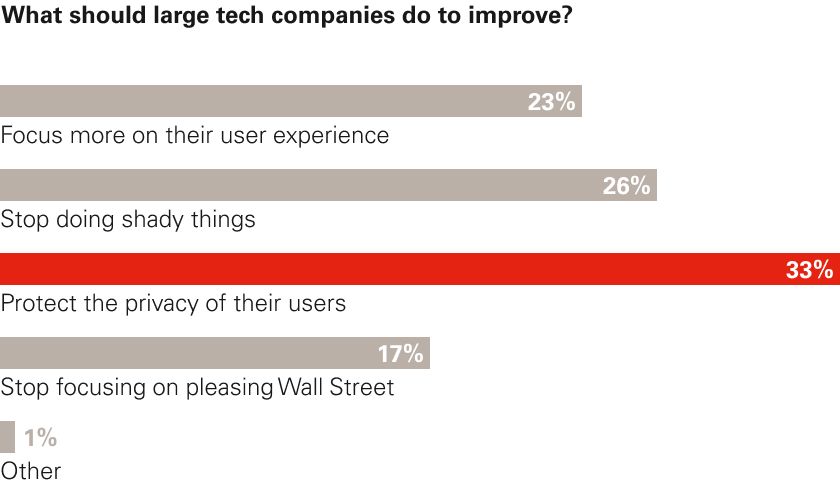
When asked how tech companies should improve, respondents again focused on privacy issues and corporate practices. One third said they need to do more to protect the privacy of their users, 26% said “they need to stop doing shady things,” 23% wanted them to focus more on user experience and 17% said they should stop trying to please Wall Street. Respondents were particularly vocal on this issue, commenting that there were monopoly issues with big tech, that technology shouldn’t be politicized and that sites should do more to stop conspiracy theories. “They need to hold themselves to higher standards,” said one commenter.
Artificial intelligence: a positive impact on the future
The most impactful technology over the next 10 years will be artificial intelligence, respondents stated. They believe its impact will be overwhelmingly positive, with 82% saying it would improve lives by increasing efficiency at work (28%), enabling innovation (27%) and better user experiences (23%), and creating new jobs (21%).
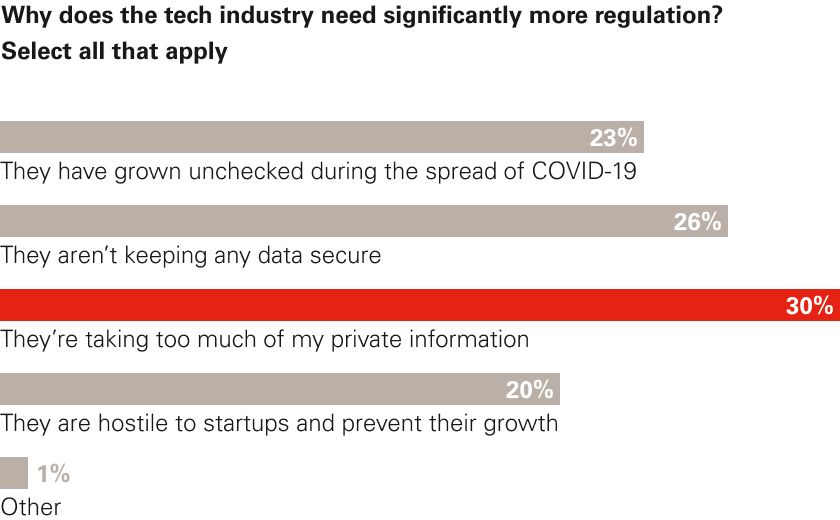
Nearly one in five said they believed it could have a negative impact, and wouldn’t create new jobs (31%), and would allow large companies to consolidate power (22%). One in five raised bias as a concern, and said AI would have a negative impact on disenfranchised people — a problem that has been raised by those concerned with algorithmic accountability. “It will be used irresponsibly by the government and large corporations to control the populace,” replied one respondent, while another said “it will most likely allow the further development of the surveillance state.”
Volpi said that like all technology, AI and automation needed to be deployed thoughtfully and used in a constructive way. “The two biggest impacts will be its effect on labor and on privacy. It’s our responsibility to be in a leadership position that will use this technology for the right things.”
“But people often overestimate what AI will be able to do for the foreseeable future — mostly it’s repetitive tasks that humans don’t want to do, like packing boxes in warehouses or truck driving for 12 hours a day. There are often labor shortages for these minimum wage jobs. I believe that if you create efficiencies in one area of the economy, you open opportunities elsewhere.”
Achadjian sees the vast potential of AI, particularly the potent combination of voice and machine learning for business applications. As remote work becomes more culturally acceptable, even more business transactions will happen over the phone or through video. AI will become a powerful tool for analyzing and predicting outcomes from this new set of data in the business world, she explained.
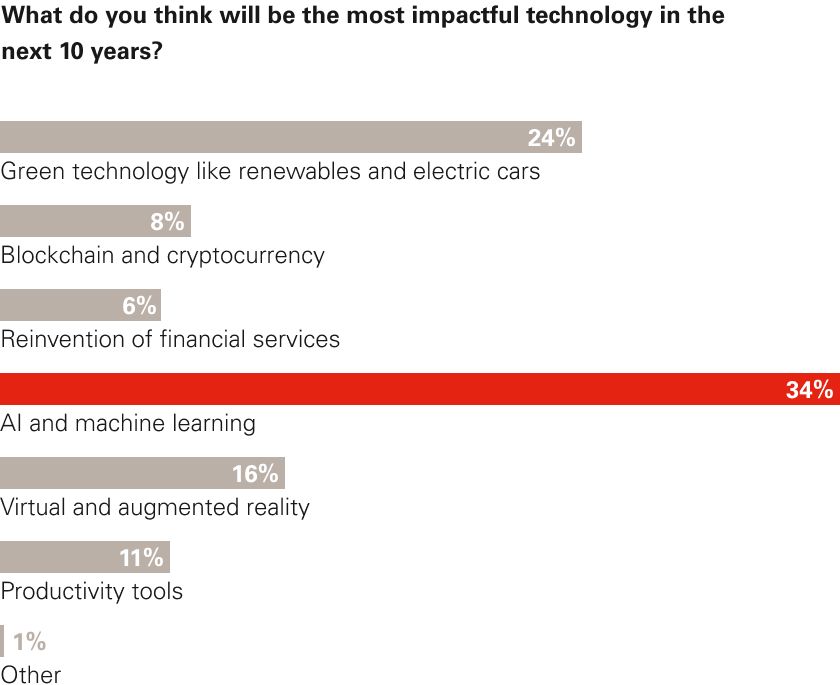
Looking ahead to 2022
"The next ten years will see a huge acceleration of legacy industries coming online, and a powerful opportunity for entrepreneurs that can rise to the challenge of our digital-first future."
— Nina Achadjian, Index Ventures
As well as specific technologies, respondents were asked what the biggest achievements would be for 2022. Better and more affordable healthcare was a priority for 30%, followed by ubiquitous global internet (29%), better IT security (17%), fully distributed applications and cryptocurrency (13%) and a manned mission to Mars (9%). Unsurprisingly, several respondents commented that a vaccine for Covid-19 would be the ultimate achievement to hope for.
"The pandemic has been a good pressure point test to see what doesn’t work when we have to shift to a purely online world,” said Achadjian. “The next ten years will see a huge acceleration of legacy industries coming online, and a powerful opportunity for entrepreneurs that can rise to the challenge of our digital-first future.”
Published — Sept. 4, 2020
-

-
